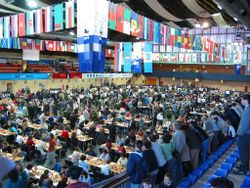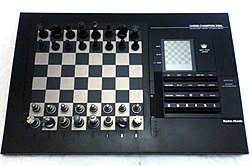Chess tournament
A chess tournament is a competition between chess players. It can take one of these forms:
- A knock-out tournament. Not a popular choice in chess events.
- An all-play-all event. A highly regarded format, but does not permit large entries.
- A Swiss system event. Permits large entries, and is the most common format. The event has a pre-set number of rounds, and there are many more players than rounds. Progressively, players play opponents with roughly similar points to their own score. Players who win get stronger opponents, players who lose get weaker opponents. Pairing each round may be done by computer.[1] This is an invention of the chess world and, like chess clocks, has been adopted by a number of other two-person sports.[2]
Since the first international chess tournament in London, 1851, chess tournaments have become the standard form of chess competition among serious players. Currently, FIDE holds candidates tournaments every two years to determine challenger to the world champion.
In 1851, Adolf Anderssen became first unofficial champion. In 1858, Paul Morphy beat him and became second unofficial champion. In 1871, Johannez Zukertort defeated Adolf Anderssen to become third unofficial chess champion. There are three unofficial world chess champions: Adolf Anderssen, Paul Morphy and Johannes Zukertort, stemming from first strong international tournament in London in 1851, won by Anderssen.
Chess Tournament Media
The 35th Chess Olympiad, a chess tournament for teams
Chess Olympiad tournament hall, Torino 2006
There were 16 participating nations in the 1st Chess Olympiad, 1927.
By the 37th Chess Olympiad, 2006, there were 133 participating nations.
A pressure-sensory chess computer with an LCD screen from the 1990s
A typical analog chess clock. Note the two separate timers.
A chess Template:Chessgloss of a 1909 match between José Raúl Capablanca and Louis Eisenberg, in descriptive notation









